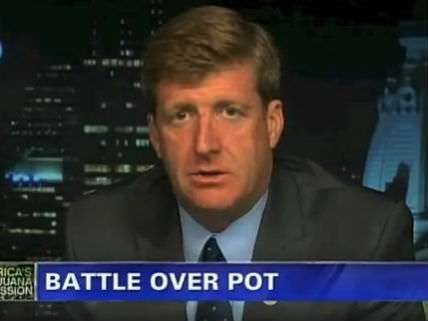Anti-Pot Group Regrets the Repeal of Alcohol Prohibition

The anti-pot group Project SAM was not pleased by President Obama's recent observation that marijuana is less dangerous than alcohol. "We take issue with the President's comparisons between marijuana and alcohol," says Project SAM Chairman Patrick J, Kennedy in a press release. He does not argue that Obama's statement was inaccurate—just that it was unhelpful to the prohibitionist cause. Kennedy explains that "two wrongs don't make a right: just because our already legal drugs may have very dangerous impacts on society it does not mean that other drugs should follow the same path." Note that the first "wrong," according to Kennedy, was making alcohol legal.
Despite that decision, which Kennedy evidently considers a mistake, the U.S. government has managed to keep marijuana illegal for 77 years. Yet Kennedy worries that "the legalization of marijuana leads quickly to a slippery slope that could open the gates to legalization—and commercialization—of other addictive substances for recreational use." After all, "several of today's largest pro-marijuana-legalization groups have been advocating for the full-scale legalization of all recreational drugs, including psychedelics and cocaine." I'm not sure which groups Kennedy has in mind. The most prominent ones, such as the Marijuana Policy Project and the Drug Policy Alliance, either do not address other drugs or take a position that falls well short of "full-scale legalization."
In any case, I wish American politicians and voters were as philosophically consistent as Kennedy suggests. But surveys find a huge gap between support for legalizing marijuana—a step backed by most Americans, according to several recent polls—and support for legalizing other drugs. A YouGov poll conducted in November, for instance, put support for legalizing heroin at 9 percent and support for legalizing cocaine at 11 percent. A 2012 Rasmussen poll got similar results.
Kennedy seems to think those gaps will be bridged soon:
Our country hasn't asked important questions about how far is too far with drug legalization. As parts of the United States plunge headlong into ill-informed drug policies rooted in opinions, political agendas and corporate greed, the President astutely notes that it is a matter of time before we're also asked to consider the legalization of a "negotiated dose of cocaine" or "a finely calibrated dose of meth." That is the nature of addiction and substance abuse. It leads to the next problem, and the next problem and the next—and many times, the damage is irreversible and irreparable.
According to Kennedy, the buzz from legalizing marijuana will soon fade, causing Americans to crave legalization of other psychoactive substances. History suggests that is the pattern followed by prohibition: A little is never enough. If legalization also works that way, I will be pleasantly surprised.


Show Comments (81)